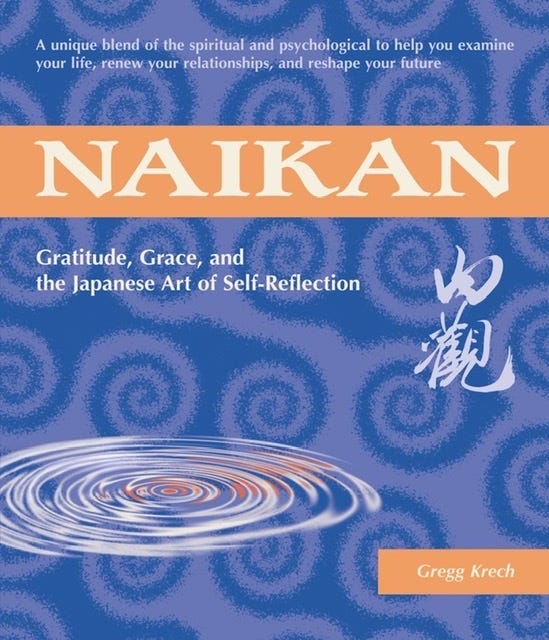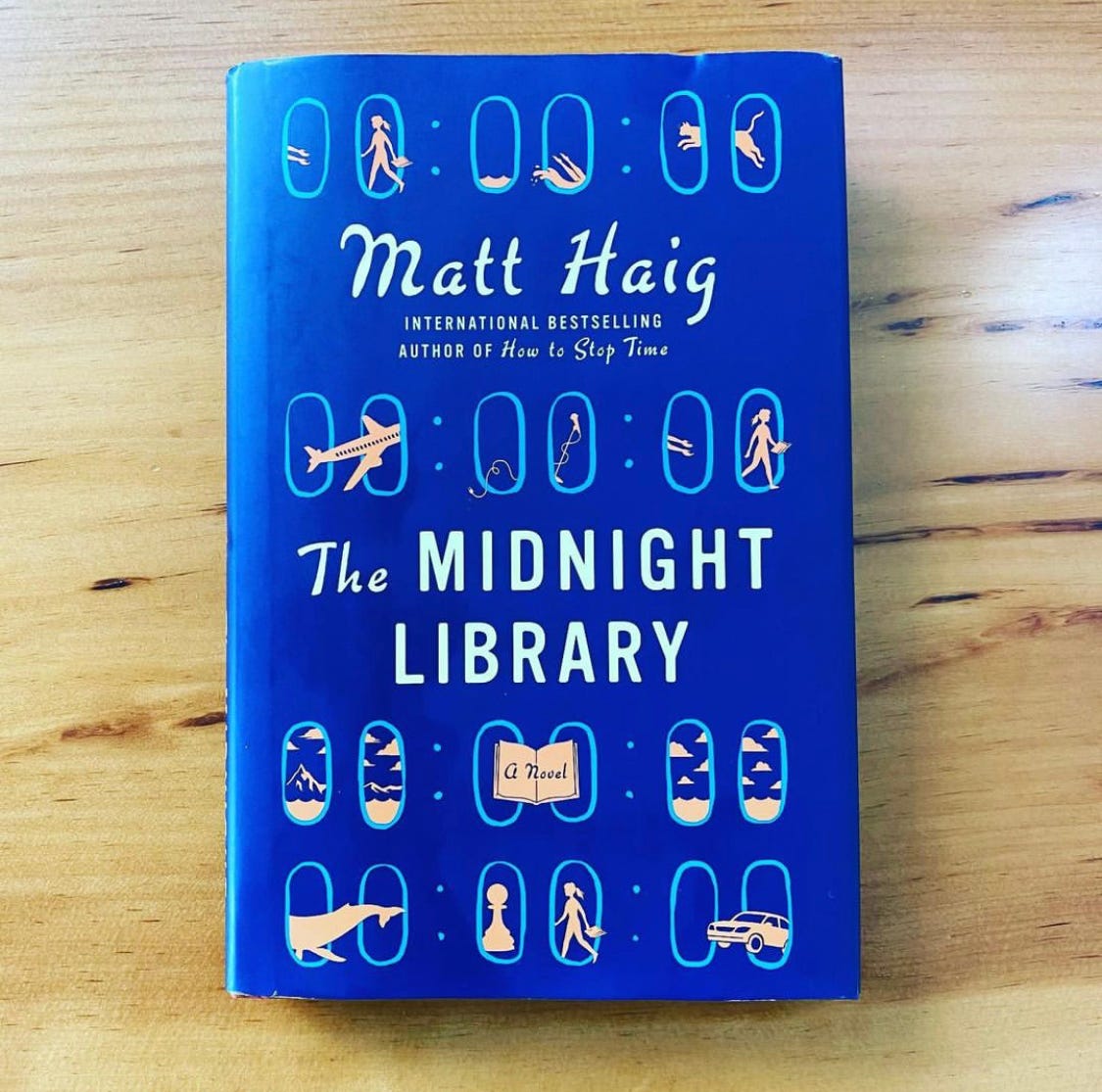What to Read Next (No. 154): a few books for reflecting on life—and this crazy year
This newsletter finds you a day earlier than usual, so that on Christmas morning you can be focused on the spirit of the day and the people around you—no matter how small the gathering.
Today I’m featuring a few books that will generally just make you feel better about life and will inspire you to reflect on what’s truly meaningful. If 2020 has taught me anything, it’s that people—relationships—are, by far, the most fulfilling aspects of life. As this unprecedented year comes to a close, spend some time reflecting.
I’m so thankful for you all and it’s crazy that another year is just about in the . . . books. (Had to include the bookish pun. Had. To.) Have a very merry Christmas weekend!
Naikan: Gratitude, Grace, and the Japanese Art of Self-Reflection by Gregg Krech
Published: 2001 | Pages: 220
“We notice the obstacles because we have to get around them to proceed. But what if we go through life only noticing obstacles, problems, and difficulties? Shouldn’t we expect our experience to be one of anger, hurt, disappointment, and anxiety? What about the support, care, and kindness we receive each day? Through such awareness, we discover the invisible gifts of life.”
While making goals for the year ahead is important, equally valuable is spending plenty of time looking in the mirror regarding the year gone by. Krech is a therapist in the tradition of Japanese morita—an action-based style of therapy. One of his older books is all about naikan, or, as the subtitle lets on, the Japanese art of self-reflection.
Krech challenges the reader to examine each of their relationships—with their partner, children, siblings, coworkers, friends, etc.—and ask three primary questions:
What have I received from ____?
What have I given to ____?
What troubles and difficulties have I caused ____?
The entire book expounds on these ideas, forcing you outside of your own head and experience (a theme shared by all the books here in this week’s newsletter). It’s sometimes a little cheesy, but going through it will make you a better person heading into 2021. Period.
His interview with the Art of Manliness podcast drops on Monday and it’s a good one.
The Midnight Library by Matt Haig
Published: 2020 | Pages: 288
“Doing one thing differently is often the same as doing everything differently.”
I’ll read anything Matt Haig publishes. His novels use whimsical plot elements—ghosts, purgatory, aliens, time travel (sort of)—to help the reader ponder life’s big questions in easy-reading and heart-warming ways, usually with some laughs along the way.
This latest one features the incredibly lovable Nora Seed, whose life is consumed by sadness, guilt, mismatched expectations, and lost opportunities. She’s so down on herself that she actually wants to end her life. In the process of doing just that, she ends up in an in-between place—the midnight library:
“Between life and death there is a library, and within that library, the shelves go on forever. Every book provides a chance to try another life you could have lived. To see how things would be if you had made other choices . . . Would you have done anything different, if you had the chance to undo your regrets?”
Nora tries out all kinds of other choices, from the big to the small. Some lives end up in fame, some lives end up in domestic anonymity. Ultimately, Nora has to figure out which decisions from her past have to change in order to get out of the midnight library and back into life. What is it that would truly make existence not only bearable, but meaningful and even happy?
Haig’s new novel re-affirmed my love for his work and cemented my habit of reading his books as soon as I can get my hands on them.
Notes on a Nervous Planet by Matt Haig
Published: 2019 | Pages: 304
“We need to find out what is good for us, and leave the rest.”
Before I read Midnight Library, I spent some time with one of Haig’s non-fiction books, Notes on a Nervous Planet. It’s a series of short essay-like chapters all about anxiety, a subject which Haig intimately knows, and what it is about our modern world that seems to fuel that anxiety:
“The whole of consumerism is based on us wanting the next thing rather than the present thing we already have. This is an almost perfect recipe for unhappiness.”
You don’t need to know much about this book other than that it’s a nice balm of soothing and affirming words that will help you re-center as we head into the new year. Very much worth your time and attention. Though it’s a book that could be read quickly, I enjoyed taking it in at the pace of just one short essay per day.
The Imitation of Christ by Thomas a Kempis
Published: ~1418 | Pages: 274
The Imitation of Christ is one of Christianity’s oldest guidebooks. Kempis was a 15th century German priest who became a prolific writer and copyist (in those days, books were hand-copied; he did the Bible at least four times). Imitation is by far his best known work and is structured like a devotional—that is, each chapter is very short and meant to be consumed just a few minutes each day.
This is a book I’ve been reading on and off for about a decade, having gone through the whole thing a few times. I don’t think to mention it here in the newsletter because I never “finish” it in my spreadsheet, but it’s had a big impact on how I view life on a day to day basis.
Ultimately, you’ll find Kempis’ exhortations to be all about thinking outside yourself and instead focusing your attention on serving the world around you. As I’ve gotten older, and as I’ve read this book more and more, my goals have become less about personal achievements and more about trying to do more for others—how can I be a better dad? husband? friend? son? neighbor? employee and coworker?
You don’t have to be religious to find a lot of this book to be worthwhile (though it certainly helps). The big ideas are applicable to anyone seeking more fulfillment and meaning in their life. Kempis is sometimes a bit of a disciplinarian for my tastes (basically, “Just will yourself to being better!”), but far more often than not I’m inspired to be a better human when I’m regularly reading him in the mornings.
That’s all for me this week. Enjoy the holiday, in whatever form it takes, and you’ll hear from me again in 2021!
-Jeremy





